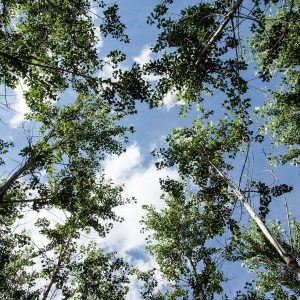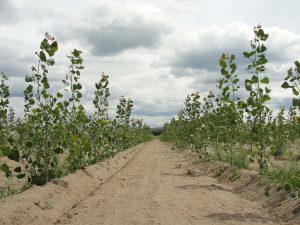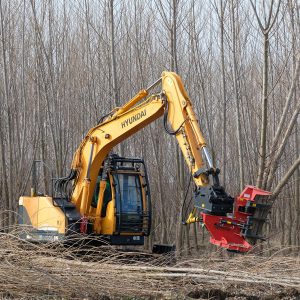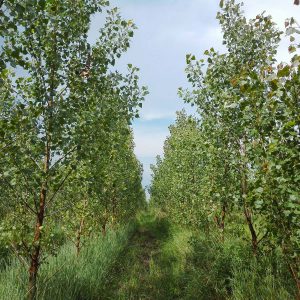
What are Short rotation plantations?
Short rotations plantations, also called short rotation coppice, are plantations of fast-growing trees cultivated on agricultural land. The most common species are willows and poplars, which are then harvested in a relatively short period of time. The harvesting period for IKEA Industry in Slovakia is planned at 5-year intervals.
How many plantations do we want to establish?
Our goal is to cultivate plantations on 4,000 hectares of land to cover 30% of the wood mass needed to produce our particle board products in Malacky from woody biomass sourced from plantations.
Aren’t plantations a waste of fertile soil?
The land we use for our poplars is of low to moderate soil quality (BPEJ classes 5 to 9), which in many cases is not suitable or cost-effective for growing common agricultural crops.

What impact does a plantation have on the soil?
Numerous experts have examined the cultivation of fast-growing trees on agricultural soil. Their studies all agree that poplar plantations improve soil properties and yields.
Researchers at a university in Pisa, Italy, report in a study that growing fast-growing poplar trees poses no risk of soil nutrient degradation and instead plantations have a positive impact on the soil, improving the level of chemical and biochemical soil parameters, contributing to biodiversity and supporting efforts to mitigate climate change.
The authors of a German and Swedish study focused on the impact of fast-growing tree species on water, soil, flora and fauna determined that the carbon sequestered by plantations of fast-growing trees was significantly higher than agricultural crops. The increase in carbon content in the soil after ten years in some cases was three times higher than recorded when the soil was used to cultivate agricultural crops. The authors attributed this change to the low level of tilling and the large quantity of leaves that fell on the ground every year, thereby gradually forming a fertile humus layer, which led to the enrichment of the soil with nitrogen. The researchers added that cultivating fast-growing trees in areas that are intensively farmed for agricultural purposes is desirable. Fast-growing tree plantations do not burden the soil with chemical fertilizers and the soil itself is less susceptible to erosion, with improved carbon sequestration, water retention and biodiversity compared to intensively managed agricultural land.

Doesn’t the use of heavy equipment used during harvesting result in excessive soil compaction?
We harvest in the winter, which is the ideal time because the ground is frozen. We only harvest trees once every 5 years, meaning the effects on the soil are minimal compared to the harvesting of ordinary agricultural products.
Planting poplars transforms agricultural land into a kind of forest. Isn’t that a problem?
Our plantations are planned for a maximum of a 20-year period and the parcels are not registered as forested land and instead they remain registered as arable land. At the end, we return the land back in the same condition or leave it in better condition that before the trees were planted and immediately ready for further agricultural use.
IKEA Industry receives subsidies from the EU. Does it receive these funds at the expense of Slovak farmers who cultivate ordinary agricultural crops?
IKEA Industry only receives agricultural subsidies for the land that it owns or rents. The farmers with whom we cooperate receive these subsidies. According to the EU’s agricultural rules, at least 5% of the land of an applicant seeking a subsidy must be used for greening (meaning land that is reserved for improving the climate and the environment), an activity which includes the cultivation of fast-growing tree species. This gives farmers the opportunity to request EU subsidies for cultivating fast-growing trees.


